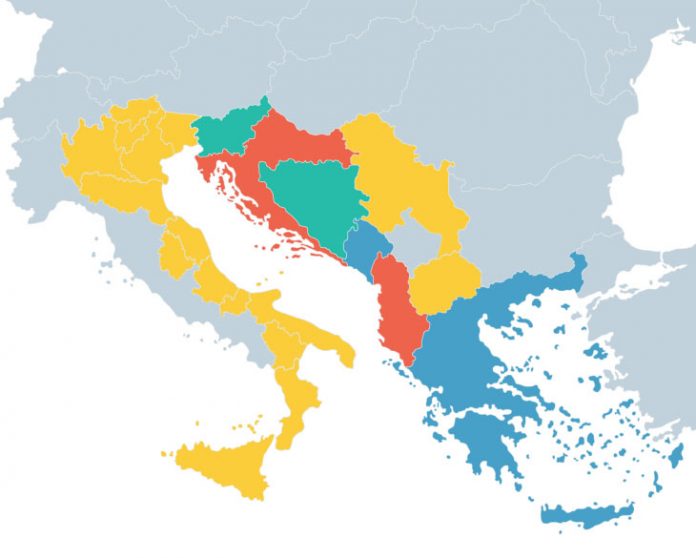The European Union Strategy for the Adriatic-Ionian Region (EUSAIR), one of the EU’s four macro-regional strategies, is a platform that supports the socio-economic development of the Adriatic-Ionian region. EUSAIR fosters cooperation among EU member states and EU candidate countries within the region.
The main objective of EUSAIR, which was adopted at an international conference in Brussels on 18 November 2014, is to promote economic and social prosperity and growth within the region. It aims to enhance the region’s attractiveness, competitiveness and connectivity, while specifically encouraging the integration of the Western Balkans into the EU – a matter of vital importance for Montenegro.
EUSAIR is implemented by ten countries: four EU member states – Greece, Croatia, Italy and Slovenia, and five candidate countries – Albania, Bosnia and Herzegovina, Montenegro, Serbia and North Macedonia and San Marino.
Cooperation within EUSAIR is centered around five thematic pillars, coordinated by the member states:
- Blue Growth (coordinators: Greece and Montenegro)
- Connecting the Region (coordinators: Italy, North Macedonia and Serbia)
- Environmental Quality (coordinators: Slovenia and Bosnia and Herzegovina)
- Sustainable Tourism (coordinators: Croatia and Albania)
- Improved Social Cohesion (coordinators: Croatia and Bosnia and Herzegovina)
The governance of the Strategy is overseen by the Governing Board, which includes thematic pillar coordinators, national coordinators, EU funds coordinators and European Commission representatives, as well as the strategic project entitled “Facility Point – Support for EUSAIR Implementation”.
In Montenegro, the implementation of EUSAIR is coordinated by the Ministry of Foreign Affairs and the Ministry of European Affairs, with appointed national coordinators leading the process. The specific responsibilities within each of the five thematic areas of this macro-regional strategy are carried out by relevant ministries.
The EUSAIR implementation and coordination process is continuously carried out within the National EUSAIR Implementation Working Group. This group includes representatives from the Ministry of Foreign Affairs, Ministry of Education, Science and Innovation, Ministry of Agriculture, Forestry and Water Management, Ministry of Economic Development, Ministry of Ecology, Sustainable Development and Development of the North, Ministry of Transport, Ministry of Energy and Mining, Ministry of Tourism, Ministry of Culture and Media, Ministry of Employment and Social Dialogue, Ministry of Sports and Youth, Institute of Marine Biology, Chamber of Commerce and the National Tourism Organisation.

To support the coordination and accelerate EUSAIR implementation through strengthening the institutional capacities of public authorities and key stakeholders, and to encourage the execution of shared priorities, the participating states are implementing a strategic project entitled FACILITY POINT – Supporting the governance of the EUSAIR.
Expected outcomes and results of the EUSAIR Facility Point project:
- Stable operational and administrative support for public authorities and key stakeholders to efficiently implement EUSAIR processes and activities.
- An expanded knowledge base and strengthened capacities of public authorities and key stakeholders in the Adriatic-Ionian region for effective policy coordination.
- Enhanced long-term cooperation across all levels and sectors in the Adriatic-Ionian region.
- Increased awareness of the added value of EUSAIR and the creation of a shared strategic vision for the Adriatic-Ionian region.
The EUSAIR Facility Point project is implemented and financed as the fourth priority of the Adriatic-Ionian Transnational Cooperation Programme Interreg IPA ADRION 2021–2027. The total project value is €7.87 million, of which €6.34 million comes from Interreg funds.
More information can be found on the Strategy’s website: https://www.adriatic-ionian.eu/about-eusair/ and the IPA ADRION website: https://www.interreg-ipa-adrion.eu.
EUSAIR operates under a system of annual rotating presidency. Montenegro was the first non-EU country to preside over EUSAIR, from June 2018 to May 2019. This milestone was of significant importance for both Montenegro and the EU enlargement process, given that EUSAIR serves as one of the mechanisms supporting the European Union accession process. The focus during Montenegro’s presidency was on Blue Growth and Sustainable Tourism, alongside the establishment of financial dialogue among non-EU countries.
North Macedonia will preside over the strategy from June 2025 to May 2026, followed by Italy (2026/2027). Montenegro will once again take on the presidency during the 2027/2028 term.
Contacts:
Tatjana Bošković, Head of Department for Horizontal Issues and Macroregional Cooperation, email: tatjana.boskovic@mep.gov.me
Miodrag Račeta, Project Officer, email: miodrag.raceta@mep.gov.me
Mirjana Roganović, projektna službenica, e-mail: mirjana.roganovic@mep.gov.me


